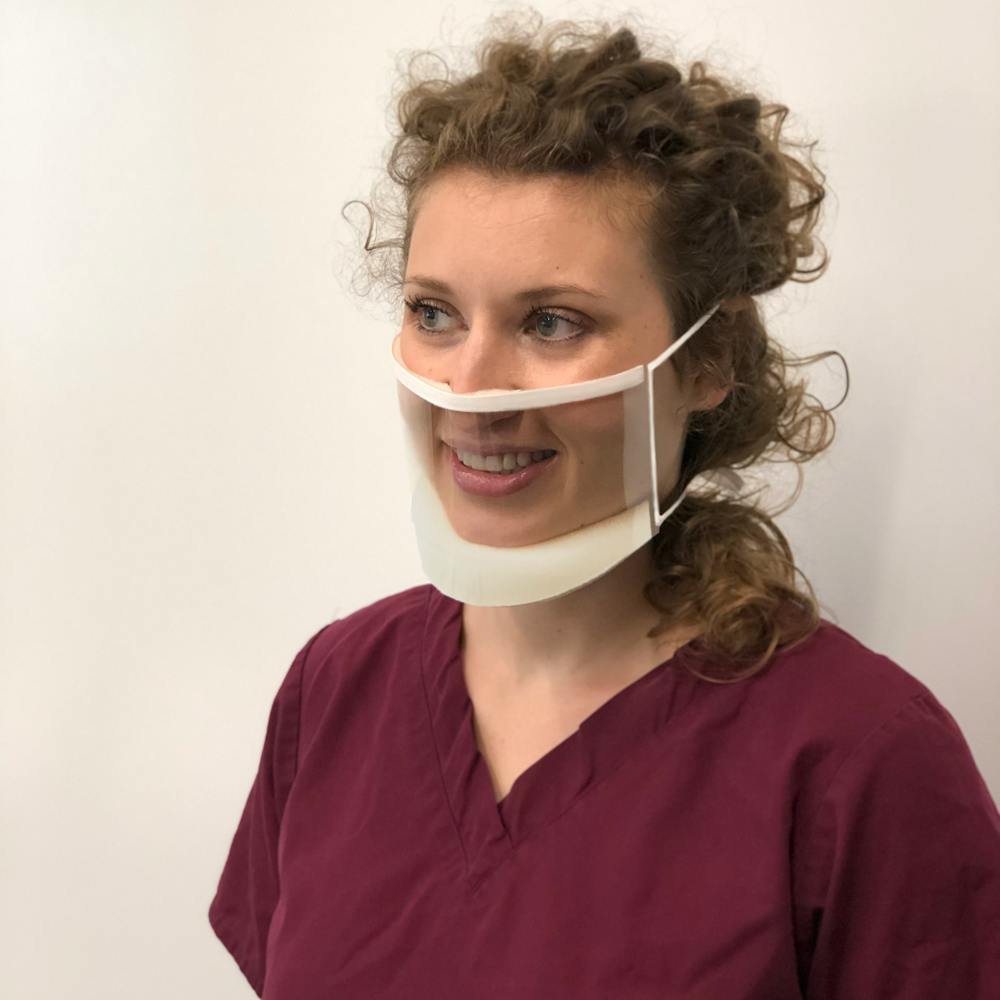ClearMask, a startup co-founded by four Hopkins alumni, has emerged as a market leader in tackling the visual communication barrier posed by traditional face masks. The ClearMask is the world’s first fully transparent face mask with approval from the Food and Drug Administration (FDA).
Co-founder of ClearMask Allysa Dittmar explained in an email to The News-Letter that sales expanded tremendously during the COVID-19 pandemic.
The team received a call from the director of the FDA on April 6 confirming that the ClearMask had secured FDA approval. This affirmed to them that ClearMask would become a full-time venture.
“Our FDA clearance brings enormous integrity into the ClearMask as the first fully transparent, FDA-cleared mask in a rapidly growing market of unregulated masks,” Dittmar wrote.
Aaron Hsu, co-founder and chief executive officer of ClearMask, described the team’s passion for the product during a talk hosted by FastForward U on Sept. 22.
“We said, ‘This is it. We’re either all quitting our jobs and doing it, or we’re not,’” Hsu said. “As with all things in a startup, you’re either all in, or you’re all out. And we decided that we were all in.”
ClearMask’s revenue jumped from April to June after setting up a Shopify store and increasing their marketing.
The ClearMask entered the market before face masks became necessary during the pandemic, beginning as a product to be used in medical settings.
Inspiration for the ClearMask struck Hsu and Dittmar following Dittmar’s adverse surgery experience in 2015. Dittmar — who is deaf — was supposed to have a sign language interpreter present throughout her procedure. However, due to an administrative error, the interpreter did not show up.
Dittmar relied on lip reading and visual cues to communicate with her doctors and nurses. This became difficult once they reached the operating room and the medical team put on surgical masks that obscured their mouths.
Dittmar was unable to answer questions on the pre-operation safety checklist. The questions on the checklist ask the patient to verbally confirm their identity and to verify various parameters like blood type, allergies and surgical site.
“It was a really dehumanizing, scary and confusing experience,” Dittmar wrote. “I was already nervous enough for the impending surgery, and then being unable to understand what’s going on or even see a reassuring smile really negatively affected my experience.”
The approximately 466 million people worldwide who experience hearing loss can benefit from this product, but transparent masks may benefit other populations as well. Children and patients who speak English as a second language often use nonverbal communication cues, such as facial expressions, to enhance their understanding.
Hsu and Dittmar knew that transparent face masks would reduce communication barriers and grant deaf patients the ability to lip-read through personal protective equipment. Although there were some existing patents, however, they soon realized that such masks were not widely available.
“No one had done it yet,” Hsu said. “People had tried, but no one had been successful.”
Hsu and Dittmar then pooled funds to begin a prior art search and to review existing patents and published patent applications.
After partnering with fellow Hopkins alumni Elyse Heob and Inez Lam, they completed the Innovation Corps (I-Corps) program through FastForward, which is part of Hopkins Technology Ventures. This led to their participation in the National Science Foundation’s I-Corps program.
Through the I-Corps program, the ClearMask team conducted 126 interviews with medical professionals. Hsu explained that they learned about potential buyers, users, and beneficiaries. This helped the team refine their value proposition.
The four co-founders have diverse educational and professional backgrounds that helped them launch ClearMask — Hsu, Dittmar and Heob have Master of Public Health degrees from the Bloomberg School of Public Health. Heob also holds a Master of Business Administration from the Carey Business School and Lam is currently a Biomedical Engineering PhD student in the School of Medicine.
While their education at Hopkins provided useful background knowledge and skills, according to Dittmar, startup accelerators like the I-Corps program and pitch competitions were incredibly beneficial.
“We learned as we went along, and we attribute most of our knowledge from hands-on, on the ground experience listening to and immediately reacting to market demand,” Dittmar wrote. “No college course could have prepared us for this experience of founding and managing a health startup.”
The company’s response to the pandemic is perhaps the best example of how they adapt to market demands.
In the middle of the pandemic, the company released a consumer version of the FDA-approved medical mask to meet increased demand. According to Dittmar, the advice of consultants combined with the team’s dedication to the cause helped the company design and sell two product lines at the same time.
“It definitely wasn’t easy, and our team had to put in countless hours around the clock to make it happen,” Dittmar wrote. “However, the knowledge we had built from our work on the medical mask and our intense passion for making the masks available to everyone, particularly during the early days of the pandemic, made it possible for us to roll out a new product within a couple months.”
The company was able to avoid the supply shortages experienced by manufacturers of N95 masks because the ClearMask is not made of polypropylene fiber, a crucial material for traditional face masks. The company currently works with Xometry, a Maryland-based manufacturer.
Schools, child care programs, Fortune 500 companies, like Apple, and state and international governments have purchased ClearMask for employees.
Having already sold 11 million face masks, ClearMask plans to continue expanding into other continents to make visual communication more accessible.
“Our co-founders know what it’s like to be confused and vulnerable, and we are proud to bring a human-centered product to the world during an extremely challenging and isolating time,” Dittmar wrote.
Trisha Parayil contributed reporting.
Clarification: Certain information that had been included in the original article due to a miscommunication in the reporting process has since been removed.
Correction: This article originally stated that Inez Lam is a PhD student in the Whiting School of Engineering. She is a student in the School of Medicine. The News-Letter regrets this error.

















